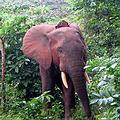 在加拿大和喀麥隆從事進出口交易的藝術經紀人,利用交易行為掩護其走私野生象牙的罪行,日前因自喀麥隆走私象牙進入美國,遭判刑5年併科罰金10萬美元。
在加拿大和喀麥隆從事進出口交易的藝術經紀人,利用交易行為掩護其走私野生象牙的罪行,日前因自喀麥隆走私象牙進入美國,遭判刑5年併科罰金10萬美元。
現年32歲,前美國蒙特婁市民、現為加拿大公民的西雅姆在3月承認犯下4項重罪後,7日在美國亞特朗市進行宣判。
10萬美元罰金將提撥給非洲大象保育基金會,用以資助各項非洲大象永續保育計劃的執行。
藉由召集喀麥隆當地藝術家及工匠、國際商船公司員工、負責非法象牙貿易的中間人,以及美國、加拿大兩地的合夥人,西雅姆在喀麥隆策劃了走私非法野生動物商品的計劃。
西雅姆計劃中的一部分,是透過網路在加拿大境外和喀麥隆當地操作藝術品的交易,再利用其他電信工具在全球促銷和販售受法規保護的野生動物商品。
2002年11月,在俄亥俄州當地一名商人的協助下,美國漁業暨野生動物局特務組織得以向西雅姆購買一批非法野生象牙。這些象牙被隱藏在陶器中,外箱標示為藝術品,再透過國際快遞從喀麥隆輸出到蒙特婁。這些象牙進入加拿大後會再被重新包裝,由西雅姆的加拿大合夥人以美加郵政出口到美國俄亥俄州。
根據美國漁業暨野生動物局統計,喀麥隆、加彭和剛果這些主要象牙供應來源的非州國家,其國內的野生非洲象數量在過去40年來已減少了75%。
造成非洲象數量大幅減少的主要原因,包括因為國際象牙交易所導致的非法獵殺,以及非法象牙交易下的副產品-利潤相當可觀的叢林肉。
An art dealer who operated import and export businesses in Canada and Cameroon that were fronts for smuggling raw elephant ivory has been sentenced to five years in prison and a $100,000 fine for smuggling ivory from Cameroon into the United States.
Canadian citizen and former Montreal resident Tania Julie Siyam, 32, was sentenced in Akron, Ohio Thursday after pleading guilty in March to four felonies.
The $100,000 fine will be given to the African Elephant Conservation Fund which supports projects that enhance sustainable conservation programs for African elephants.
In Cameroon, Siyam devised a plan to smuggle illegal wildlife products by soliciting local artists and craftsmen, operatives within international commercial shipping companies, contacts in the illegal ivory trade, a partner in Canada, and a partner in the United States.
As part of her scheme, Siyam operated numerous Internet art businesses out of Canada, and Cameroon and used other telecommunications to advertise and sell regulated and protected wildlife products to customers throughout the world.
During November 2002, with the assistance of a local Ohio business owner, U.S. Fish and Wildlife Service special agents were able to purchase a shipment of illegal raw elephant ivory from Siyam. The ivory tusks were concealed inside pottery, labeled as art, and sent by international courier from Cameroon to Montreal.
Once in Canada, the goods were repackaged and shipped by Siyam's Canadian partner, via the Canadian and U.S. Postal Service, to the Ohio business address.
Wild populations of African elephants in the African countries of Cameroon, Gabon and the Congo, the main sources of elephant ivory, have dropped by about 75 percent in the last 40 years, according to the U.S. Fish and Wildlife Service.
The main cause for this decline in elephant populations is believed to be the illegal hunting of elephants for the international ivory trade, and for bush meat, which is a lucrative by-product of the illegal ivory trade.
全文及圖片詳見:ENS





